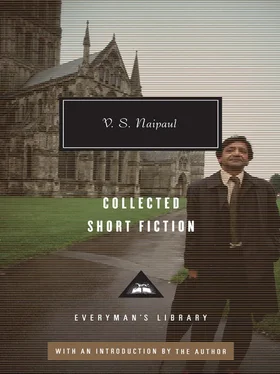The owner of the café was the laughing-stock of the street for several weeks, and it was only after a long time that people began going to the café again.
Hat said, ‘Is just like I say. Boy, I don’t like meddling with that man. These people really bad-mind, you know. God make them that way.’
It was things like this that made people leave Man-man alone. The only friend he had was a little mongrel dog, white with black spots on the ears. The dog was like Man-man in a way, too. It was a curious dog. It never barked, never looked at you, and if you looked at it, it looked away. It never made friends with any other dog, and if some dog tried either to get friendly or aggressive, Man-man’s dog gave it a brief look of disdain and ambled away, without looking back.
Man-man loved his dog, and the dog loved Man-man. They were made for each other, and Man-man couldn’t have made a living without his dog.
Man-man appeared to exercise a great control over the movements of his dog’s bowels.
Hat said, ‘That does really beat me. I can’t make that one out.’
It all began in Miguel Street.
One morning, several women got up to find that the clothes they had left to bleach overnight had been sullied by the droppings of a dog. No one wanted to use the sheets and the shirts after that, and when Man-man called, everyone was willing to give him the dirty clothes.
Man-man used to sell these clothes.
Hat said, ‘Is things like this that make me wonder whether the man really mad.’
From Miguel Street Man-man’s activities spread, and all the people who had suffered from Man-man’s dog were anxious to get other people to suffer the same thing.
We in Miguel Street became a little proud of him.
* * *
I don’t know what it was that caused Man-man to turn good. Perhaps the death of his dog had something to do with it. The dog was run over by a car, and it gave, Hat said, just one short squeak, and then it was silent.
Man-man wandered about for days, looking dazed and lost.
He no longer wrote words on the pavement; no longer spoke to me or to any of the other boys in the street. He began talking to himself, clasping his hands and shaking as though he had ague.
Then one day he said he had seen God after having a bath.
This didn’t surprise many of us. Seeing God was quite common in Port of Spain and, indeed, in Trinidad at that time. Ganesh Pundit, the mystic masseur from Fuente Grove, had started it. He had seen God, too, and had published a little booklet called What God Told Me . Many rival mystics and not a few masseurs had announced the same thing, and I suppose it was natural that since God was in the area Man-man should see Him.
Man-man began preaching at the corner of Miguel Street, under the awning of Mary’s shop. He did this every Saturday night. He let his beard grow and he dressed in a long white robe. He got a Bible and other holy things and stood in the white light of an acetylene lamp and preached. He was an impressive preacher, and he preached in an odd way. He made women cry, and he made people like Hat really worried.
He used to hold the Bible in his right hand and slap it with his left and say in his perfect English accent, ‘I have been talking to God these few days, and what he tell me about you people wasn’t really nice to hear. These days you hear all the politicians and them talking about making the island self-sufficient. You know what God tell me last night? Last night self, just after I finish eating? God say, “Man-man, come and have a look at these people.” He show me husband eating wife and wife eating husband. He show me father eating son and mother eating daughter. He show me brother eating sister and sister eating brother. That is what these politicians and them mean by saying that the island going to become self-sufficient. But, brethren, it not too late now to turn to God.’
I used to get nightmares every Saturday night after hearing Man-man preach. But the odd thing was that the more he frightened people the more they came to hear him preach. And when the collection was made they gave him more than ever.
In the week-days he just walked about, in his white robe, and he begged for food. He said he had done what Jesus ordered and he had given away all his goods. With his long black beard and his bright deep eyes, you couldn’t refuse him anything. He noticed me no longer, and never asked me, ‘So you goes to school?’
The people in Miguel didn’t know what to make of the change. They tried to comfort themselves by saying that Man-man was really mad, but, like me, I think they weren’t sure that Man-man wasn’t really right.
What happened afterwards wasn’t really unexpected.
Man-man announced that he was a new Messiah.
Hat said one day, ‘You ain’t hear the latest?’
We said, ‘What?’
‘Is about Man-man. He say he going to be crucified one of these days.’
‘Nobody go touch him,’ Edward said. ‘Everybody fraid of him now.’
Hat explained. ‘No, it ain’t that. He going to crucify hisself. One of these Fridays he going to Blue Basin and tie hisself to a cross and let people stone him.’
Somebody — Errol, I think — laughed, but finding that no one laughed with him, fell silent again.
But on top of our wonder and worry, we had this great pride in knowing that Man-man came from Miguel Street.
Little hand-written notices began appearing in the shops and cafés and on the gates of some houses, announcing Man-man’s forthcoming crucifixion.
‘They going to have a big crowd in Blue Basin,’ Hat announced, and added with pride, ‘and I hear they sending some police, too.’
That day, early in the morning, before the shops opened and the trolley-buses began running in Ariapita Avenue, the big crowd assembled at the corner of Miguel Street. There were lots of men dressed in black and even more women dressed in white. They were singing hymns. There were also about twenty policemen, but they were not singing hymns.
When Man-man appeared, looking very thin and very holy, women cried and rushed to touch his gown. The police stood by, prepared to handle anything.
A van came with a great wooden cross.
Hat, looking unhappy in his serge suit, said, ‘They tell me it make from match-wood. It ain’t heavy. It light light.’
Edward said, in a snapping sort of way, ‘That matter? Is the heart and the spirit that matter.’
Hat said, ‘I ain’t saying nothing.’
Some men began taking the cross from the van to give it to Man-man, but he stopped them. His English accent sounded impressive in the early morning. ‘Not here. Leave it for Blue Basin.’
Hat was disappointed.
We walked to Blue Basin, the waterfall in the mountains to the northwest of Port of Spain, and we got there in two hours. Man-man began carrying the cross from the road, up the rocky path and then down to the Basin.
Some men put up the cross, and tied Man-man to it.
Man-man said, ‘Stone me, brethren.’
The women wept and flung bits of sand and gravel at his feet.
Man-man groaned and said, ‘Father, forgive them. They ain’t know what they doing.’ Then he screamed out, ‘Stone me, brethren!’
A pebble the size of an egg struck him on the chest.
Man-man cried, ‘Stone, stone , STONE me, brethren! I forgive you.’
Edward said, ‘The man really brave.’
People began flinging really big stones at Man-man, aiming at his face and chest.
Man-man looked hurt and surprised. He shouted, ‘What the hell is this? What the hell you people think you doing? Look, get me down from this thing quick, let me down quick, and I go settle with that son of a bitch who pelt a stone at me.’
From where Edward and Hat and the rest of us stood, it sounded like a cry of agony.
Читать дальше









